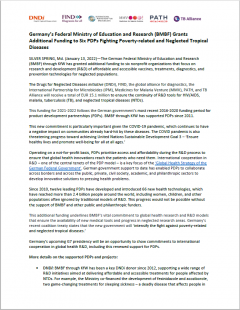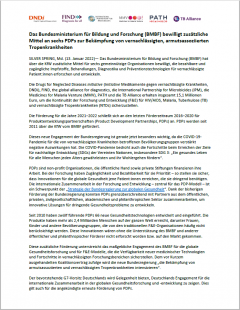Germany’s Federal Ministry of Education and Research (BMBF) Grants Additional Funding to Six PDPs Fighting Poverty-related and Neglected Tropical Diseases
SILVER SPRING, Md. (January 13, 2022)—The German Federal Ministry of Education and Research (BMBF) through KfW has granted additional funding to six nonprofit organizations that focus on research and development (R&D) of affordable and accessible vaccines, treatments, diagnostics, and prevention technologies for neglected populations.
The Drugs for Neglected Diseases initiative (DNDi), FIND, the global alliance for diagnostics, the International Partnership for Microbicides (IPM), Medicines for Malaria Venture (MMV), PATH, and TB Alliance will receive a total of EUR 15.1 million to ensure the continuity of R&D tools for HIV/AIDS, malaria, tuberculosis (TB), and neglected tropical diseases (NTDs).
This funding for 2021-2022 follows the German government's most recent 2016-2020 funding period for product development partnerships (PDPs). BMBF through KfW has supported PDPs since 2011.
This new commitment is particularly important given the COVID-19 pandemic, which continues to have a negative impact on communities already hard-hit by these diseases. The COVID pandemic is also threatening progress toward achieving United Nations Sustainable Development Goal 3 – ‘Ensure healthy lives and promote well-being for all at all ages.’
Operating on a not-for-profit basis, PDPs prioritize access and affordability during the R&D process to ensure that global health innovations reach the patients who need them. International cooperation in R&D – one of the central tenets of the PDP model – is a key focus of the ‘Global Health Strategy of the German Federal Government’. German government support to date has enabled PDPs to collaborate across borders and across the public, private, civil society, academic, and philanthropic sectors to develop innovative solutions to pressing health problems.
Since 2010, twelve leading PDPs have developed and introduced 66 new health technologies, which have reached more than 2.4 billion people around the world, including women, children, and other populations often ignored by traditional models of R&D. This progress would not be possible without the support of BMBF and other public and philanthropic funders.
This additional funding underlines BMBF’s vital commitment to global health research and R&D models that ensure the availability of new medical tools and progress in neglected research areas. Germany’s recent coalition treaty states that the new government will ‘intensify the fight against poverty-related and neglected tropical diseases.’
Germany's upcoming G7 presidency will be an opportunity to show commitments to international cooperation in global health R&D, including this renewed support for PDPs.
Read the full release in English or German.
About IPM: IPM is a nonprofit organization dedicated to developing new HIV prevention tools like the dapivirine ring and other sexual and reproductive health technologies for women, and making them available in developing countries. IPM has offices in the United States, South Africa and Belgium. Please visit www.IPMglobal.org.

